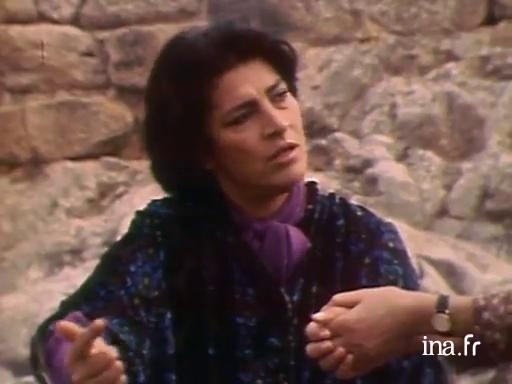Irène Papas
Yes.
That's speaking for myself, I can't speak for others,
but personally, I want to be direct and real when I play.
And to have the need to say something, otherwise I won't say anything.
When I take on a role, this summer for example, I played Cleopatra, I took all of the biographies I could find.
I read a bit of history everywhere.
And I thought:
All of the time I had to figure out what was she thinking about?
Why did she say that?
And what's her relationship with that man who's standing in front of her?
And what is this moment all about?
What's the weather like? Is it hot? Is it cold?
For example, for the clothing I got for Cleopatra.
White clothing because it's hot in Egypt.
So, what I wanted was organza because it stays, it stays like that.
So, that's all, because it helps me to know that it's white, that it's hot and all that.
So, that's my work on the things that I do.
And also, when you decide what the character that you're playing is like.
For example, I have a different idea about Cleopatra, so I do my interpretation of her.
For example, everyone thinks that Cleopatra is a woman who does things just like that.
That she's appearance-conscious.
I don't think so.
She was the richest one at that time, and she was the most cultivated one because there were...
behind her, there was a large library, the biggest one in the world at that time.
And who was Julius Cesar?
A commander who knew two languages: Greek and Latin.
She knew 15 languages.
So, I think you're the one who's appearance-conscious. Her, she was the richest.
She wasn't...
Journalist
She was rich, intelligent, cultivated.
Irène Papas
As the queen, she had all of Egypt, she had all of Egypt's gold, she had all the engineers, everything...
Journalist
He's the one who made...
Irène Papas
And Antony as well.
Even now, in the 20th century, I think that a woman,
she's always the secretary that wants to seduce her...
what do you call it... chief?
Journalist
Her boss.
Irène Papas
Her boss.
So we think like that.
But no!
She doesn't do anything.
We do that.
You also have to be smart enough to know where to include the right motion, where to put the emphasis in each scene.
Doing all this graduation work...
Also, you have to master all the techniques, the voice, the pronunciation
Because you can't "obstaculate"?
Journalist
Yes, put up obstacles.
Irène Papas
To touch people's souls.
That's right, it's very difficult for a foreigner like me,
to play with the language when it's French, English or Italian.
I make lots of efforts. I acted in plays in English and also in Italian,
and I had extraordinary results but I worked 4 hours a day each morning to say:
"Hello, Hello...", just like that, 10 times, the same word 40 times.
And afterwards, 40 more times, the other word, and then, the entire sentence.
Journalist
Until you master the phrase?
Irène Papas
Yes, until I don't think about it.
So when I'm there, the text...
I don't think about it.
It happens naturally, because, you know, as soon as there's silence, what do you do?
You can think of a Greek word to say, but you have to say an Italian or English word.
So, I have to work very hard.
Also, to eliminate things, for the other work, the real work,
you have to start with lots and eliminate, eliminate and keep the right things.
I think that, you can achieve this by working very, very hard.
Because I don't think that it's only instinct that works at that time,
and I think that art, it's a completely spiritual and mental choice.
For me, but you have to be able to do it...
Journalist
As if it were easy?
Irène Papas
Yes.














